
Updated: 05/12/2024
Are you planning kitchen remodel and finding yourself stuck on selecting the right range hood? With hundreds and hundreds of brands, models, and options available, making a final selection can be quite difficult and confusing!
But it doesn’t have to be!
Now, I know that you want to get it right the first time. So grab your wish list and objectives, and let’s go through a quick checklist to find that perfect hood for your next kitchen remodel.
TABLE OF CONTENTS
- Range Hood Selection - Objectives
- Range Hood Wish List
- Selecting the Best Range Hood
- Range Hood Maintenance
- Range Hood Resources
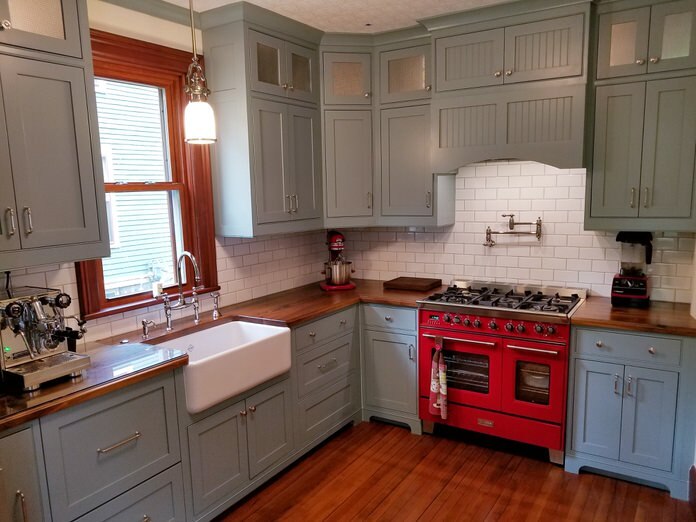 Vintage Kitchen Remodel with Remote Blower Range Hood
Vintage Kitchen Remodel with Remote Blower Range Hood
Range Hood Selection - Objectives
Before you go shopping for a new range hood though, you will need to think about its intended use, purpose, and your expected outcomes (expectation management). This is a good time to refer back to your kitchen design, schematics, and layout. What ever brand and model you choose MUST be compatible with your space, layout, and other kitchen equipment - think cabinets, custom covers, stove, etc. But...

Q: What do you need your new hood to do?
Q: What conditions will it need to operate in? Mild or heavy cooking and use?
Think about these THREE design elements as you as you narrow down the models, brands, and options:
| FIT |
| FORM |
| FUNCTION |
1. Fit
- Physical Size constraints
- Shape constraints
- Dimensional constraints (length, width, height, depth)
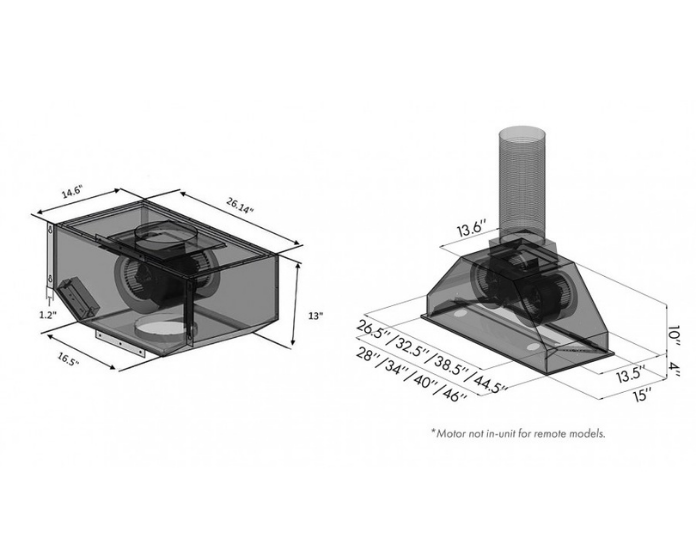 Kitchen Range Hood Dimensions
Kitchen Range Hood Dimensions
2. Form
- Style (see Range Hood selection below).
- Materials - copper, stainless steel, wood, hidden (insert), trim, accents, etc).
- Filter type - disposable metal mesh or removable/washable metal baffle.
- Ease of MAINTENANCE and CLEANING. This is important, as it WILL get very dirty/greasy with use.
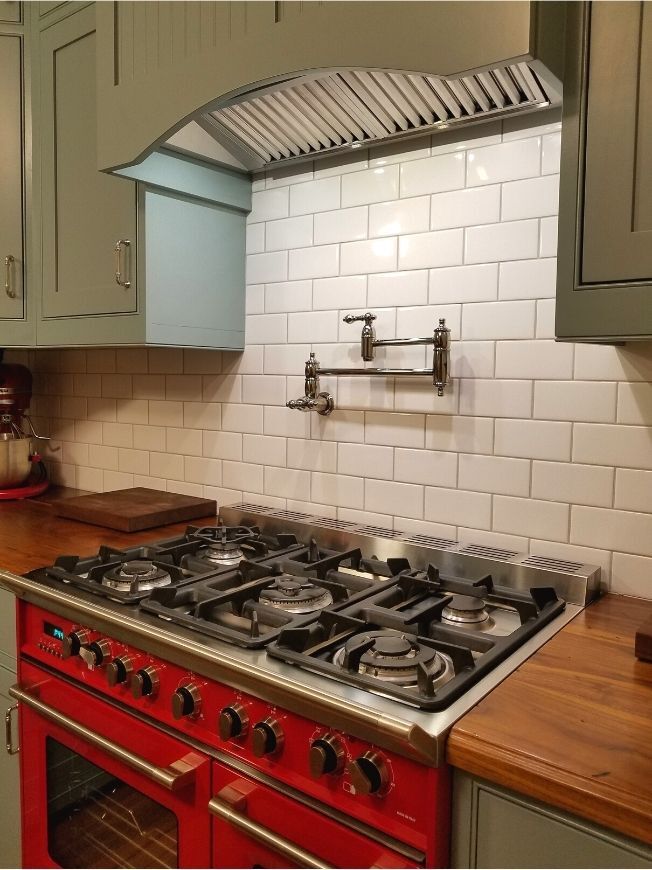 Stove and Matched Range Hood
Stove and Matched Range Hood
3. Function
- Performance Requirements - Pairing the hood with the stove and room size will define this requirement. That's why its important to plan and know the additional equipment and appliances to be integrated into the final design. For example, you don't want to buy a hood just because it was on sale, that only covers half the depth of the cook top and 75% of the width of the stove. This will drastically reduce the performance of the hood! So make sure you get the right fit - 1) covers the majority, if not ALL of the cook top DEPTH, and 2) at least as wide as the stove (minimum). Two to four inches wider on each side is preferred, but based on space constraints.
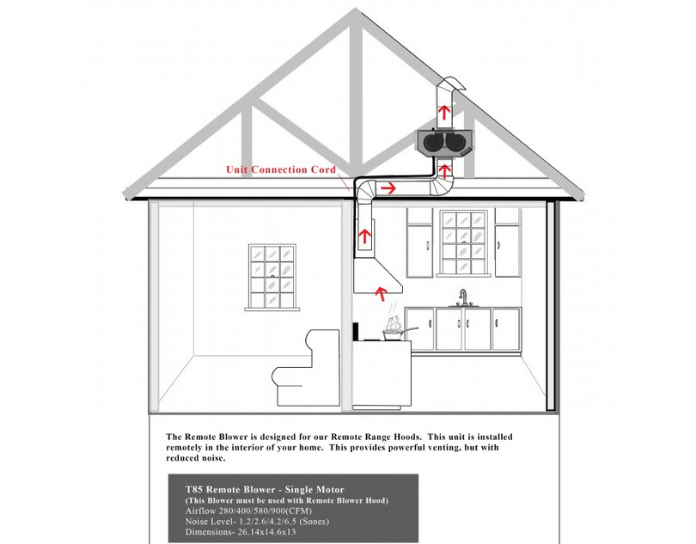 Range Hood Installation Diagram
Range Hood Installation Diagram
- How Much Power? What size range hood do you need - or rather, CFM (Cubic Feet per Minute) of air moved? You'll need a SINGLE motor (most stoves up to 36 inches wide) or a DUAL motor (36 inches and wider).
- NOTE: Refer to the Range Hood Tutorial/Buyers Guide from The Range Hood Store - RESOURCES section at bottom of the page.
| SINGLE MOTOR (100 - 900 cfm) |
| DUAL MOTOR (100 - 1000+ cfm) |
Range Hood Wish List
What would your “perfect” range hood do, in terms of features? Here are some good examples to ask yourself:
- Provide heat removal when cooking?
- Condensation removal when cooking?
- Food odor removal when cooking? No one likes a smelly house!
- Easy to clean?
- Dishwasher friendly vs disposable grease filters?
- Noisy or ultra quiet? Are you tired of yelling over your current hood?
- Any deal breakers? Size, shape, location, color, materials, integration with other kitchen equipment, cabinets, etc?
Selecting the Best Range Hood
Based on your requirements, kitchen design/plan, and wish list, its time to select a range hood that meets your needs and style! Here are the most common types that you can choose from:
1. Under Cabinet Recirculating Range Hood - includes mircowaves (non-vented)
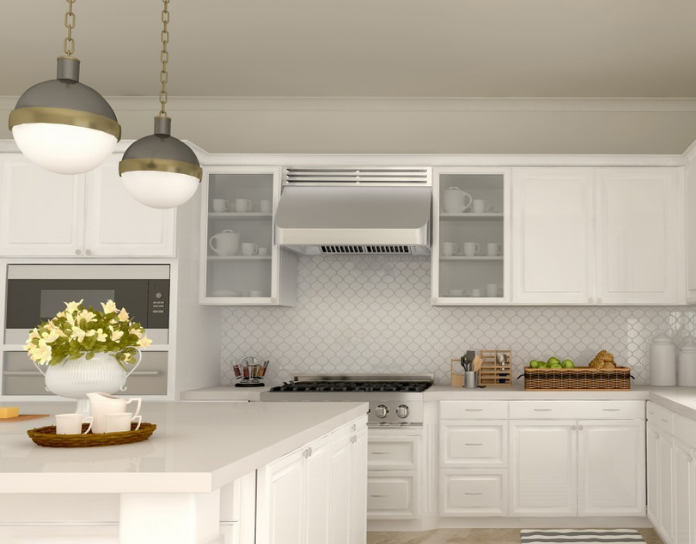 Under Cabinet Recirculating Range Hood
Under Cabinet Recirculating Range Hood
- Non-vented.
- For exterior or interior wall locations.
- Loud motor in the kitchen hood assembly.
- Did I mention they are loud!
- It only filters the air.
- Doesn’t remove heat or humidity...only recycles it.
- I don’t recommend this option, but if you must have a microwave over the range, then it may be your only option.
2. Under Cabinet Range Hood - includes microwaves (vented)
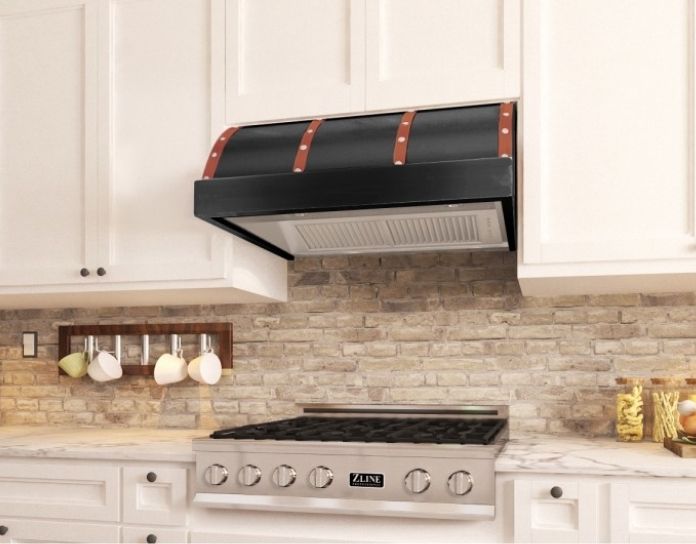 Under Cabinet Range Hood, Vented
Under Cabinet Range Hood, Vented
- Vented to outside.
- Good for exterior or interior wall locations.
- Exterior wall: Loud motor in the kitchen hood assembly. Duct runs out of the rear, and exits through the wall - EASY EXIT.
- Interior wall: Loud motor in the kitchen hood assembly. Duct runs out of the top, and through upper cabinets to exterior wall exit - TENDS TO WASTE CABINET SPACE.
- Interior wall: Quiet operation with remote blower if attic/basement space is available - BEST OPTION TO CONTROL NOISE LEVELS.
- For over-the-stove microwaves, here is a vented "Convertible Microwave Option". NOTE: Refer to the Range RESOURCES section at bottom of the page.
3. Freestanding Range Hood (vented) –loud motor in the kitchen assembly
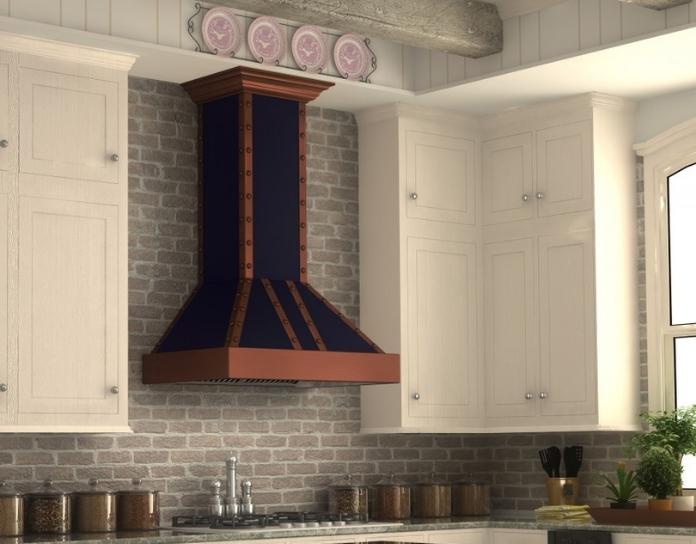 Freestanding Range Hood, Vented
Freestanding Range Hood, Vented
- Includes "Island" range hoods.
- Vented to outside.
- Good for exterior or interior wall locations.
- Exterior wall: Loud motor in the kitchen hood assembly. Duct runs out of the rear, and exits through the wall - EASY EXIT.
- Interior wall: Loud motor in the kitchen hood assembly. Duct runs out of the top, and through upper cabinets to exterior wall exit - TENDS TO WASTE CABINET SPACE.
- Interior wall: Quiet operation with remote blower if attic/basement space is available - BEST OPTION TO CONTROL NOISE LEVELS.
- Island*: Duct runs out of the top, and through the ceiling cavity to exterior wall exit. In some instances, it could be used with a remote blower in an attic. * Downdraft at the countertop level, may be another option.
4. Range Hood Insert (vented)
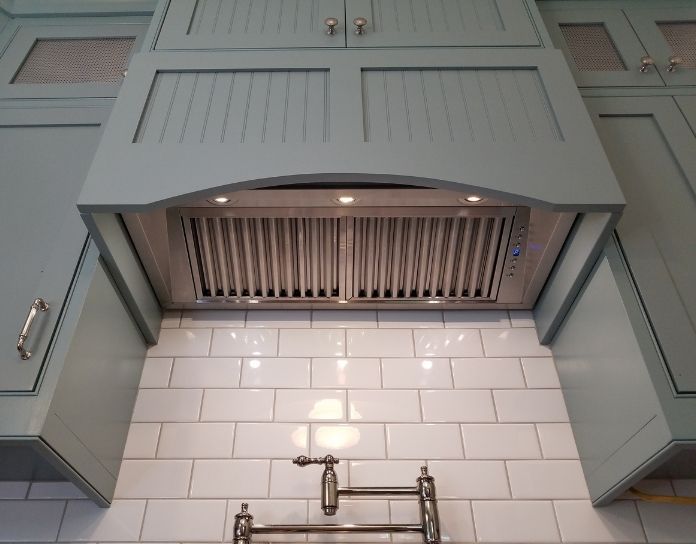 Range Hood Insert, Vented
Range Hood Insert, Vented
- Vented to outside.
- Good for exterior or interior wall locations.
- "Inserts" into custom kitchen cabinet assembly, with a front service panel.
- Exterior wall: Loud motor in the kitchen hood assembly. Duct runs out of the rear, and exits through the wall - EASY EXIT.
- Interior wall: Loud motor in the kitchen hood assembly. Duct runs out of the top, and through upper cabinets to exterior wall exit - TENDS TO WASTE CABINET SPACE.
- Interior wall: Quiet operation with remote blower if attic/basement space is available - BEST OPTION TO CONTROL NOISE LEVELS.
5. Remote Blower - located remotely in attic or basement
- Super-quiet operation vs a standard range hood with motor in the hood assembly (kitchen).
- Non-exterior wall application – pipe/duct can run in a dedicated wall cavity, out the back or top of the range hood box, and to the remote blower where it exists the house (basement or attic).
- Refer back to the Remote Blower Range Hood Installation blog for more info.
- See this range hood insert (above) fully integrated and installed during the Vintage Kitchen remodel.
Range Hood Maintenance
Follow these simple tips to keep your new range hood operating like new and prevent it from becoming "gunked" up with grease.
Cleaning Tips
- Exterior - wipe down outside of cabinet as needed.
- Clean per manufacturer's instructions.
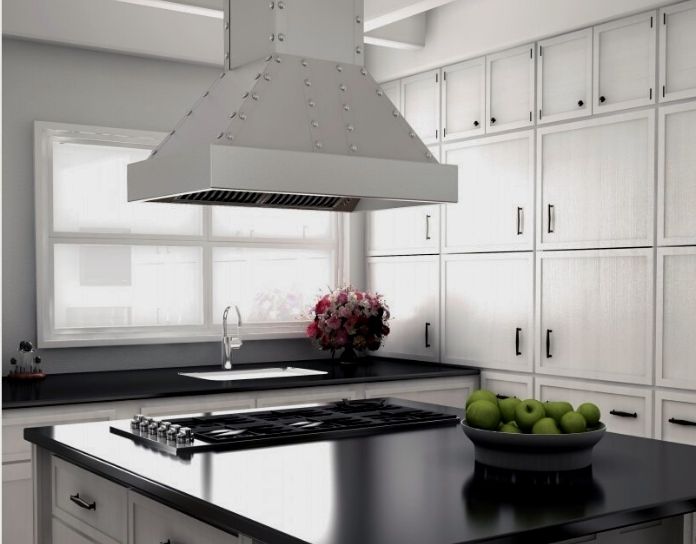 Exterior Cleaning, Range Hood
Exterior Cleaning, Range Hood
- Interior - wipe down inside of cabinet as needed to prevent grease buildup.
- Wipe/clean around any controls and keep area clean.
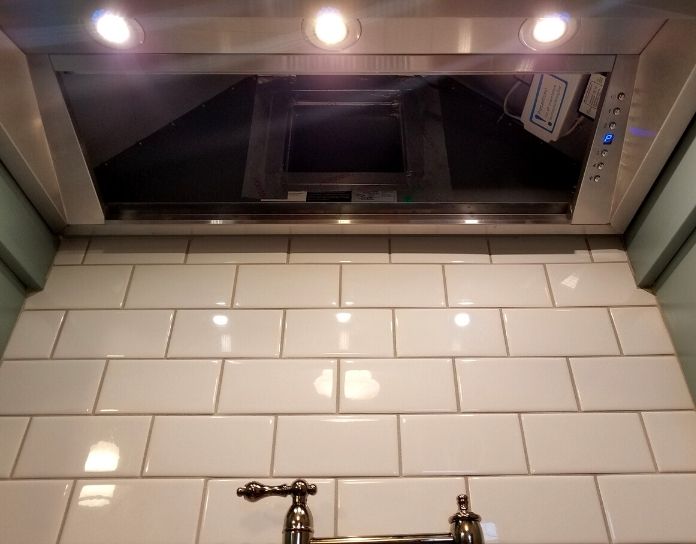 Interior Cleaning, Range Hood
Interior Cleaning, Range Hood
- Bottom Tray/Channel - clean regularly, hand-wash or dishwasher if it fits.
- Removable Filters - wash in the dishwasher, or discard/replace if they are the disposable type.
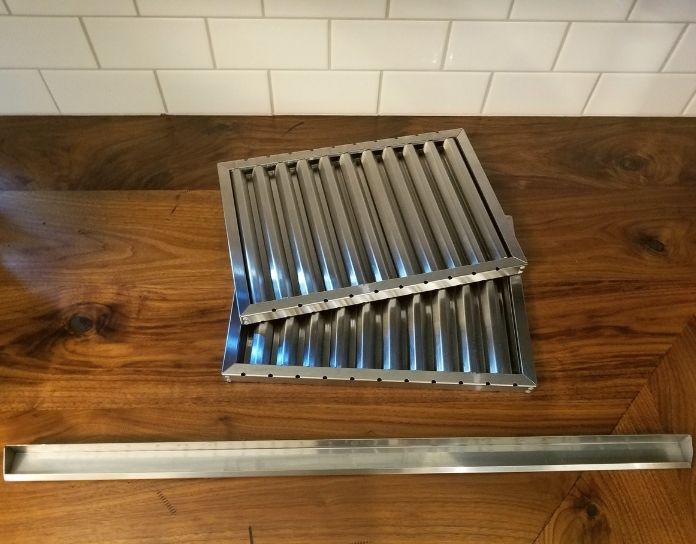 Reusable Range Hood Filters
Reusable Range Hood Filters
- Mesh Filters / Metal Baffles (shown) - wash as needed. Many are dishwasher friendly.
- The baffles are more durable, don't wear out, and are easier to clean, as they are "commercial" style - just smaller!
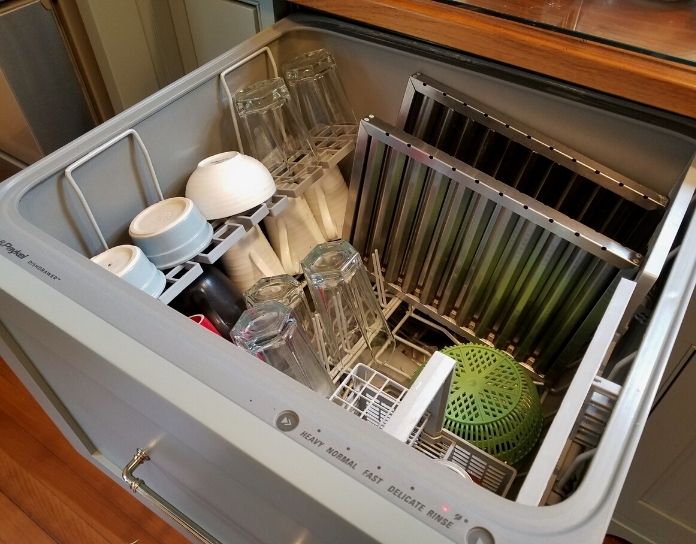 Easy Filter Clean-up in Dishwasher
Easy Filter Clean-up in Dishwasher
- Remote Blower - check drip tray inside fan housing, annually. Clean as needed.
- Wipe inside as needed, if you have access.
- This area shouldn't get too dirty if the primary filters in the kitchen are working properly.
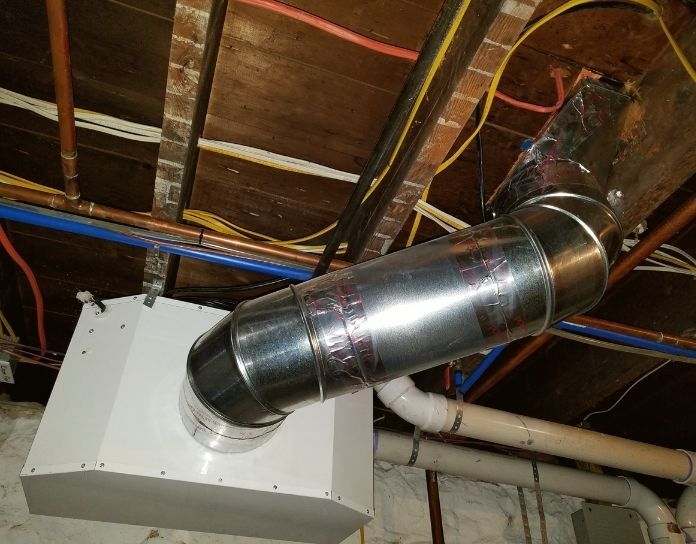 Remote Blower Located in Basement Below Kitchen
Remote Blower Located in Basement Below Kitchen
Range Hood Resources
Refer to the following Links and Resources as mentioned in this Blog:
Range Hood Tutorial/Buyers Guide
The Range Hood Store - Range Hoods
ZLINE Kitchen - Range Hood Resources
Blog-Vintage Kitchen Range Hood Installation
Conclusion
Range hood selection can be difficult and confusing with the many options to choose from! But, with a little information from My Old House Fix, you’ll be on the right track in no time! All you need to start is a wish list, a plan, and the tasks you need your new range hood to accomplish. With a little homework on your end...you'll end up with the perfect Range Hood for your new kitchen!

Best of luck, and keep on Fixing!

For more info visit: www.myoldhousefix.com

Posts may contain affiliate links. If you use these links to buy something, we may earn a small commission (at no additional cost to you). Full disclaimer HERE.

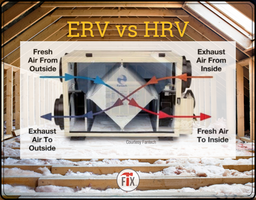
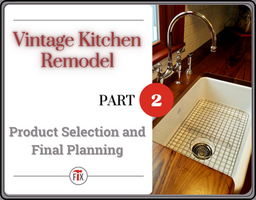


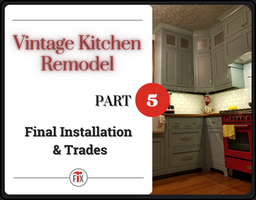
0 Comment(s)